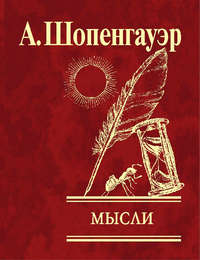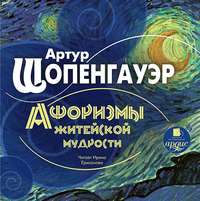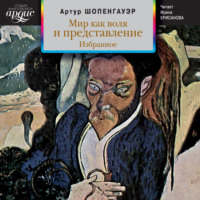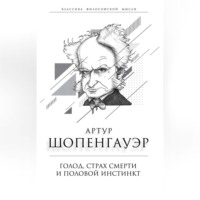 полная версия
полная версияThe World as Will and Idea (Vol. 2 of 3)
That Arithmetic rests on the pure intuition or perception of time is not so evident as that Geometry is based upon that of space.15 It can be proved, however, in the following manner. All counting consists in the repeated affirmation of unity. Only for the purpose of always knowing how often we have already affirmed unity do we mark it each time with another word: these are the numerals. Now repetition is only possible through succession. But succession, that is, being after one another, depends directly upon the intuition or perception of time. It is a conception which can only be understood by means of this; and thus counting also is only possible by means of time. This dependence of all counting upon time is also betrayed by the fact that in all languages multiplication is expressed by “time,” thus by a time-concept: sexies, ἑξακις, six fois, sex mal. But simple counting is already a multiplication by one, and for this reason in Pestalozzi's educational establishment the children are always made to multiply thus: “Two times two is four times one.” Aristotle already recognised the close relationship of number and time, and expounded it in the fourteenth chapter of the fourth book of the “Physics.” Time is for him “the number of motion” (“ὁ χρονος αριθμος εστι κινησεως”). He very profoundly suggests the question whether time could be if the soul were not, and answers it in the negative. If arithmetic had not this pure intuition or perception of time at its foundation, it would be no science a priori, and therefore its propositions would not have infallible certainty.
Although time, like space, is the form of knowledge of the subject, yet, just like space, it presents itself as independent of the subject and completely objective. Against our will, or without our knowledge, it goes fast or slow. We ask what o'clock it is; we investigate time, as if it were something quite objective. And what is this objective existence? Not the progress of the stars, or of the clocks, which merely serve to measure the course of time itself, but it is something different from all things, and yet, like them, independent of our will and knowledge. It exists only in the heads of percipient beings, but the uniformity of its course and its independence of the will give it the authority of objectivity.
Time is primarily the form of inner sense. Anticipating the following book, I remark that the only object of inner sense is the individual will of the knowing subject. Time is therefore the form by means of which self-consciousness becomes possible for the individual will, which originally and in itself is without knowledge. In it the nature of the will, which in itself is simple and identical, appears drawn out into a course of life. But just on account of this original simplicity and identity of what thus exhibits itself, its character remains always precisely the same, and hence also the course of life itself retains throughout the same key-note, indeed its multifarious events and scenes are at bottom just like variations of one and the same theme.
The a priori nature of the law of causality has, by Englishmen and Frenchmen, sometimes not been seen at all, sometimes not rightly conceived of; and therefore some of them still prosecute the earlier attempts to find for it an empirical origin. Maine de Biran places this in the experience that the act of will as cause is followed by the movement of the body as effect. But this fact itself is untrue. We certainly do not recognise the really immediate act of will as something different from the action of the body, and the two as connected by the bond of causality; but both are one and indivisible. Between them there is no succession; they are simultaneous. They are one and the same thing, apprehended in a double manner. That which makes itself known to inner apprehension (self-consciousness) as the real act of will exhibits itself at once in external perception, in which the body exists objectively as an action of the body. That physiologically the action of the nerve precedes that of the muscle is here immaterial, for it does not come within self-consciousness; and we are not speaking here of the relation between muscle and nerve, but of that between the act of will and the action of the body. Now this does not present itself as a causal relation. If these two presented themselves to us as cause and effect their connection would not be so incomprehensible to us as it actually is; for what we understand from its cause we understand as far as there is an understanding of things generally. On the other hand, the movement of our limbs by means of mere acts of will is indeed a miracle of such common occurrence that we no longer observe it; but if we once turn our attention to it we become keenly conscious of the incomprehensibility of the matter, just because in this we have something before us which we do not understand as the effect of a cause. This apprehension, then, could never lead us to the idea of causality, for that never appears in it at all. Maine de Biran himself recognises the perfect simultaneousness of the act of will and the movement (Nouvelles Considérations des Rapports du Physique au Moral, p. 377, 378). In England Thomas Reid (On the First Principles of Contingent Truths, Essay IV. c. 5) already asserted that the knowledge of the causal relation has its ground in the nature of the faculty of knowledge itself. Quite recently Thomas Brown, in his very tediously composed book, “Inquiry into the Relation of Cause and Effect,” 4th edit., 1835, says much the same thing, that that knowledge springs from an innate, intuitive, and instinctive conviction; thus he is at bottom upon the right path. Quite unpardonable, however, is the crass ignorance on account of which in this book of 476 pages, of which 130 are devoted to the refutation of Hume, absolutely no mention is made of Kant, who cleared up the question more than seventy years ago. If Latin had remained the exclusive language of science such a thing would not have occurred. In spite of Brown's exposition, which in the main is correct, a modification of the doctrine set up by Maine de Biran, of the empirical origin of the fundamental knowledge of the causal relation, has yet found acceptance in England; for it is not without a certain degree of plausibility. It is this, that we abstract the law of causality from the perceived effect of our own body upon other bodies. This was already refuted by Hume. I, however, have shown that it is untenable in my work, “Ueber den Willen in der Natur” (p. 75 of the second edition, p. 82 of the third), from the fact that since we apprehend both our own and other bodies objectively in spatial perception, the knowledge of causality must already be there, because it is a condition of such perception. The one genuine proof that we are conscious of the law of causality before all experience lies in the necessity of making a transition from the sensation, which is only empirically given, to its cause, in order that it may become perception of the external world. Therefore I have substituted this proof for the Kantian, the incorrectness of which I have shown. A most full and thorough exposition of the whole of this important subject, which is only touched on here, the a priori nature of the law of causality and the intellectual nature of empirical perception, will be found in my essay on the principle of sufficient reason, § 21, to which I refer, in order to avoid the necessity of repeating here what is said there. I have also shown there the enormous difference between the mere sensation of the senses and the perception of an objective world, and discovered the wide gulf that lies between the two. The law of causality alone can bridge across this gulf, and it presupposes for its application the two other forms which are related to it, space and time. Only by means of these three combined is the objective idea attained to. Now whether the sensation from which we start to arrive at apprehension arises through the resistance which is suffered by our muscular exertion, or through the impression of light upon the retina, or of sound upon the nerves of the brain, &c. &c., is really a matter of indifference. The sensation always remains a mere datum for the understanding, which alone is capable of apprehending it as the effect of a cause different from itself, which the understanding now perceives as external, i. e., as something occupying and filling space, which is also a form inherent in the intellect prior to all experience. Without this intellectual operation, for which the forms must lie ready in us, the perception of an objective, external world could never arise from a mere sensation within our skin. How can it ever be supposed that the mere feeling of being hindered in intended motion, which occurs also in lameness, could be sufficient for this? We may add to this that before I attempt to affect external things they must necessarily have affected me as motives. But this almost presupposes the apprehension of the external world. According to the theory in question (as I have remarked in the place referred to above), a man born without arms and legs could never attain to the idea of causality, and consequently could never arrive at the apprehension of the external world. But that this is not the case is proved by a fact communicated in Froriep's Notizen, July 1838, No. 133 – the detailed account, accompanied by a likeness, of an Esthonian girl, Eva Lauk, then fourteen years old, who was born entirely without arms or legs. The account concludes with these words: “According to the evidence of her mother, her mental development had been quite as quick as that of her brothers and sisters; she attained just as soon as they did to a correct judgment of size and distance, yet without the assistance of hands. – Dorpat, 1st March 1838, Dr. A. Hueck.”
Hume's doctrine also, that the conception of causality arises from the custom of seeing two states constantly following each other, finds a practical refutation in the oldest of all successions, that of day and night, which no one has ever held to be cause and effect of each other. And the same succession also refutes Kant's false assertion that the objective reality of a succession is only known when we apprehend the two succeeding events as standing in the relation of cause and effect to each other. Indeed the converse of this doctrine of Kant's is true. We know which of the two connected events is the cause and which the effect, empirically, only in the succession. Again, on the other hand, the absurd assertion of several professors of philosophy in our own day that cause and effect are simultaneous can be refuted by the fact that in cases in which the succession cannot be perceived on account of its great rapidity, we yet assume it with certainty a priori, and with it the lapse of a certain time. Thus, for example, we know that a certain time must elapse between the falling of the flint and the projection of the bullet, although we cannot perceive it, and that this time must further be divided between several events that occur in a strictly determined succession – the falling of the flint, the striking of the spark, ignition, the spread of the fire, the explosion, and the projection of the bullet. No man ever perceived this succession of events; but because we know which is the cause of the others, we thereby also know which must precede the others in time, and consequently also that during the course of the whole series a certain time must elapse, although it is so short that it escapes our empirical apprehension; for no one will assert that the projection of the bullet is actually simultaneous with the falling of the flint. Thus not only the law of causality, but also its relation to time, and the necessity of the succession of cause and effect, is known to us a priori. If we know which of two events is the cause and which is the effect, we also know which precedes the other in time; if, on the contrary, we do not know which is cause and which effect, but only know in general that they are causally connected, we seek to discover the succession empirically, and according to that we determine which is the cause and which the effect. The falseness of the assertion that cause and effect are simultaneous further appears from the following consideration. An unbroken chain of causes and effects fills the whole of time. (For if this chain were broken the world would stand still, or in order to set it in motion again an effect without a cause would have to appear.) Now if every effect were simultaneous with its cause, then every effect would be moved up into the time of its cause, and a chain of causes and effects containing as many links as before would fill no time at all, still less an infinite time, but would be all together in one moment. Thus, under the assumption that cause and effect are simultaneous, the course of the world shrinks up into an affair of a moment. This proof is analogous to the proof that every sheet of paper must have a certain thickness, because otherwise the whole book would have none. To say when the cause ceases and the effect begins is in almost all cases difficult, and often impossible. For the changes (i. e., the succession of states) are continuous, like the time which they fill, and therefore also, like it, they are infinitely divisible. But their succession is as necessarily determined and as unmistakable as that of the moments of time itself, and each of them is called, with reference to the one which precedes it, “effect,” and with reference to the one which follows it, “cause.”
Every change in the material world can only take place because another has immediately preceded it: this is the true and the whole content of the law of causality. But no conception has been more misused in philosophy than that of cause, by means of the favourite trick or blunder of conceiving it too widely, taking it too generally, through abstract thinking. Since Scholasticism, indeed properly since Plato and Aristotle, philosophy has been for the most part a systematic misuse of general conceptions. Such, for example, are substance, ground, cause, the good, perfection, necessity, and very many others. A tendency of the mind to work with such abstract and too widely comprehended conceptions has shown itself almost at all times. It may ultimately rest upon a certain indolence of the intellect, which finds it too difficult a task to be constantly controlling thought by perception. By degrees such unduly wide conceptions come to be used almost like algebraical symbols, and tossed about like them, and thus philosophy is reduced to a mere process of combination, a kind of reckoning which (like all calculations) employs and demands only the lower faculties. Indeed there finally results from this a mere juggling with words, of which the most shocking example is afforded us by the mind-destroying Hegelism, in which it is carried to the extent of pure nonsense. But Scholasticism also often degenerated into word-juggling. Nay even the “Topi” of Aristotle – very abstract principles, conceived with absolute generality, which one could apply to the most different kinds of subjects, and always bring into the field in arguing either pro or contra– have also their origin in this misuse of general conceptions. We find innumerable examples of the way the Schoolmen worked with such abstractions in their writings, especially in those of Thomas Aquinas. But philosophy really pursued the path which was entered on by the Schoolmen down to the time of Locke and Kant, who at last bethought themselves as to the origin of conceptions. Indeed we find Kant himself, in his earlier years, still upon that path, in his “Proof of the Existence of God” (p. 191 of the first volume of Rosenkranz's edition), where the conceptions substance, ground, reality, are used in such a way as would never have been possible if he had gone back to the source of these conceptions and to their true content which is determined thereby. For then he would have found as the source and content of substance simply matter, of ground (if things of the real world are in question) simply cause, that is, the prior change which brings about the later change, &c. It is true that in this case such an investigation would not have led to the intended result. But everywhere, as here, such unduly wide conceptions, under which, therefore, more was subsumed than their true content would have justified, there have arisen false principles, and from these false systems. Spinoza's whole method of demonstration rests upon such uninvestigated and too widely comprehended conceptions. Now here lies the great merit of Locke, who, in order to counteract all that dogmatic unreality, insisted upon the investigation of the origin of the conceptions, and thus led back to perception and experience. Bacon had worked in a similar frame of mind, yet more with reference to Physics than to Metaphysics. Kant followed the path entered upon by Locke, but in a higher sense and much further, as has already been mentioned above. To the men of mere show who succeeded in diverting the attention of the public from Kant to themselves the results obtained by Locke and Kant were inconvenient. But in such a case they know how to ignore both the dead and the living. Thus without hesitation they forsook the only right path which had at last been found by those wise men, and philosophised at random with all kinds of indiscriminately collected conceptions, unconcerned as to their origin and content, till at last the substance of the Hegelian philosophy, wise beyond measure, was that the conceptions had no origin at all, but were rather themselves the origin and source of things. But Kant has erred in this respect. He has too much neglected empirical perception for the sake of pure perception – a point which I have fully discussed in my criticism of his philosophy. With me perception is throughout the source of all knowledge. I early recognised the misleading and insidious nature of abstractions, and in 1813, in my essay on the principle of sufficient reason, I pointed out the difference of the relations which are thought under this conception. General conceptions must indeed be the material in which philosophy deposits and stores up its knowledge, but not the source from which it draws it; the terminus ad quem, not a quo. It is not, as Kant defines it, a science drawn from conceptions, but a science in conceptions. Thus the conception of causality also, with which we are here concerned, has always been taken far too widely by philosophers for the furtherance of their dogmatic ends, and much was imported into it which does not belong to it at all. Hence arose propositions such as the following: “All that is has its cause” – “the effect cannot contain more than the cause, thus nothing that was not also in the cause” – “causa est nobilior suo effectu,” and many others just as unwarranted. The following subtilty of that insipid gossip Proclus affords an elaborate and specially lucid example of this. It occurs in his “Institutio Theologica,” § 76: “Παν το απο ακινητου γιγνομενον αιτιας, αμεταβλητον εχει την ὑπαρξιν; παν δε το απο κινουμενης, μεταβλητην; ει γαρ ακινητον εστι παντῃ το ποιουν, ου δια κινησεως, αλλ᾽ αυτῳ τῳ ειναι παραγει το δευτερον αφ᾽ ἑαυτου.” (Quidquid ab immobili causa manat, immutabilem habet essentiam [substantiam]. Quidquid vero a mobili causa manat, essentiam habet mutabilem. Si enim illud, quod aliquid facit, est prorsus immobile, non per motum, sed per ipsum Esse producit ipsum secundum ex se ipso.) Excellent! But just show me a cause which is not itself set in motion: it is simply impossible. But here, as in so many cases, abstraction has thought away all determinations down to that one which it is desired to make use of without regard to the fact that the latter cannot exist without the former. The only correct expression of the law of causality is this: Every change has its cause in another change which immediately precedes it. If something happens, i. e., if a new state of things appears, i. e., if something is changed, then something else must have changed immediately before, and something else again before this, and so on ad infinitum, for a first cause is as impossible to conceive as a beginning of time or a limit of space. More than this the law of causality does not assert. Thus its claims only arise in the case of changes. So long as nothing changes there can be no question of a cause. For there is no a priori ground for inferring from the existence of given things, i. e., states of matter, their previous non-existence, and from this again their coming into being, that is to say, there is no a priori ground for inferring a change. Therefore the mere existence of a thing does not justify us in inferring that it has a cause. Yet there may be a posteriori reasons, that is, reasons drawn from previous experience, for the assumption that the present state or condition did not always exist, but has only come into existence in consequence of another state, and therefore by means of a change, the cause of which is then to be sought, and also the cause of this cause. Here then we are involved in the infinite regressus to which the application of the law of causality always leads. We said above: “Things, i. e., states or conditions of matter,” for change and causality have only to do with states or conditions. It is these states which we understand by form, in the wider sense; and only the forms change, the matter is permanent. Thus it is only the form which is subject to the law of causality. But the form constitutes the thing, i. e., it is the ground of the difference of things; while matter must be thought as the same in all. Therefore the Schoolmen said, “Forma dat esse rei;” more accurately this proposition would run: Forma dat rei essentiam, materia existentiam. Therefore the question as to the cause of a thing always concerns merely its form, i. e., its state or quality, and not its matter, and indeed only the former so far as we have grounds for assuming that it has not always existed, but has come into being by means of a change. The union of form and matter, or of essentia and existentia, gives the concrete, which is always particular; thus, the thing. And it is the forms whose union with matter, i. e., whose appearance in matter by means of a change, are subject to the law of causality. By taking the conception too widely in the abstract the mistake slipped in of extending causality to the thing absolutely, that is, to its whole inner nature and existence, thus also to matter, and ultimately it was thought justifiable to ask for a cause of the world itself. This is the origin of the cosmological proof. This proof begins by inferring from the existence of the world its non-existence, which preceded its existence, and such an inference is quite unjustifiable; it ends, however, with the most fearful inconsistency, for it does away altogether with the law of causality, from which alone it derives all its evidencing power, for it stops at a first cause, and will not go further; thus ends, as it were, by committing parricide, as the bees kill the drones after they have served their end. All the talk about the absolute is referable to a shamefast, and therefore disguised cosmological proof, which, in the face of the “Critique of Pure Reason,” has passed for philosophy in Germany for the last sixty years. What does the absolute mean? Something that is, and of which (under pain of punishment) we dare not ask further whence and why it is. A precious rarity for professors of philosophy! In the case, however, of the honestly expressed cosmological proof, through the assumption of a first cause, and therefore of a first beginning in a time which has absolutely no beginning, this beginning is always pushed further back by the question: Why not earlier? And so far back indeed that one never gets down from it to the present, but is always marvelling that the present itself did not occur already millions of years ago. In general, then, the law of causality applies to all things in the world, but not to the world itself, for it is immanent in the world, not transcendent; with it it comes into action, and with it it is abolished. This depends ultimately upon the fact that it belongs to the mere form of our understanding, like the whole of the objective world, which accordingly is merely phenomenal, and is conditioned by the understanding. Thus the law of causality has full application, without any exception, to all things in the world, of course in respect of their form, to the variation of these forms, and thus to their changes. It is valid for the actions of men as for the impact of a stone, yet, as we have said always, merely with regard to events, to changes. But if we abstract from its origin in the understanding and try to look at it as purely objective, it will be found in ultimate analysis to depend upon the fact that everything that acts does so by virtue of its original, and therefore eternal or timeless, power; therefore its present effect would necessarily have occurred infinitely earlier, that is, before all conceivable time, but that it lacked the temporal condition. This temporal condition is the occasion, i. e., the cause, on account of which alone the effect only takes place now, but now takes place necessarily; the cause assigns it its place in time.









